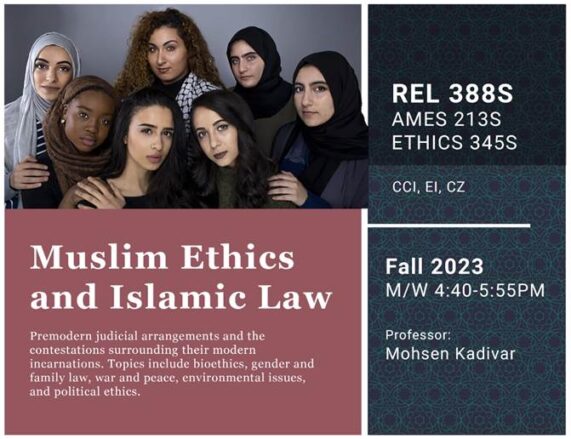
RELIGION 388S, ETHICS 345S, AMES 206S
MUSLIM ETHICS AND ISLAMIC LAW
(Seminar)
Instructor: Professor Mohsen Kadivar
Fall 2023
MW 4:40-5:55 PM, Venue: Allen 226
Islam encompasses both faith and action. In traditional Muslim thought, theology (kalam) discusses faith and belief, whereas jurisprudence (fiqh) addresses matters of action and practice. The shari‘a is made up of Islamic ordinances or laws. As an integral part of Islam as a lived practice, understanding the shari‘a is key to understanding the Islamic religion.
On the other hand, debates on ethics and values in Muslim societies and communities -irrespective of whether they are in majority or minority contexts – are self-evident to even the most casual observer. How do we get a better grasp of diverse moral debates in Muslim societies on modern questions? These ethical debates impact policy questions ranging from gender, democratic citizenship, technology, and sexual violence to matters related to the ethics of war and peace. But of equal importance is the need to give attention to the various contexts in which Muslim ethical discourses are shaped.
This course will explore a select sample of questions from competing ethical perspectives. One of the presumptions that this course makes is that Muslim ethics is not only the site for the renewal of a moral tradition; in many instances, but it is also the site of resistance against cultural and political imperialism, as well as that of accommodation. These complicated maneuvers account for the diversity and multiplicity of contemporary Muslim ethical discourses. Ethics is not neutral to political debates: it is often at the center of fractious and divisive debates. Often the representation of ethical debates is caricatured and manipulated in the media to serve political ends.
In this course, we will be attentive to the confluence of various discourses: history, politics, and anthropology in dialogue with the interpretative regimes of religious discourses in Islam. The amalgam of these elements constitutes Muslim ethics. Muslim religious discourses are, of course, essentially regimes of interpretation. This involves not only the interpretation of the primary religious sources of Islam that result in diverse iterations and accounts of Muslim ethics but also how these teachings respond to multiple social contexts. Ethics provide maps of the histories of interpretative communities and allow us to identify the various typologies as well as trajectories of the Muslim subject in the present and the past.

